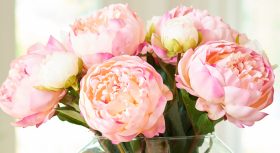When Life Gets Hard
I bought thirty-six peonies yesterday at Trader Joe’s. They were having a sale, and although my grandmother would have disapproved—she wouldn’t buy flowers because “they always die”—I decided that staggering beauty was at least as important as Greek yogurt. As the cashier—a twenty-something woman with pink hair, three silver nose rings and a rainbow-serpent tattoo twining around her left arm—was ringing up one double-ruffled bunch after the other, she said, “forty-two dollars and worth every penny!” I nodded and thought of the lines from the Mary Oliver poem about peonies and their “eagerness/to be wild and perfect for a moment before they are nothing, forever.” (I like the wild and perfect part, but I’m not so sure about being nothing forever).
As I was arranging the flowers in a vase, my friend Sabine called. “My brother had another brain aneurysm,” she blurted. “He is in critical condition, they don’t know whether he will survive the night.” After another minute she said, “I don’t want to be the only one left in my nuclear family.” When I hung up the phone, I thought once again how difficult it is to be in a human body. How everything is taken away, either quickly as in having a brain aneurysm or slowly, as in getting old and losing one function after another. (Note to self: if there is reincarnation, and if anyone is listening, I’m not coming back. Besides avoiding brain aneurysms and dementia, not having to go through high school again is at the top of the list.)
A spiritual teacher once told me that “what’s real never dies.” That whatever you can lose in a shipwreck (clothes, money, people, your life) wasn’t yours to begin with. And that you might as well spend your life paying attention to what can never die otherwise you get to the end, and you can’t believe you are actually dying and are about to lose everything you love: your cat, your iPad, your body.
Since I didn’t want to be hanging on to my pink angora sweater when I took my last breath, I attended dozens of meditation retreats, took trips to India, practiced presence. But, no matter how much I sensed, practiced, and meditated, I was haunted by the feeling of not enough–not enough success, not enough money, not enough love—and the attendant belief that having enough meant having more. I was absolutely convinced that enough was a quantity, and that once I reached that magical amount—which was a moving target, and always more than I had at any given moment—I could relax, be at peace, be comfortable in my own skin.
Then, sixteen years ago, my husband and I lost every dime of our combined thirty-year life savings in a Ponzi scheme. I was already well practiced in disasters and catastrophes— I’d almost died from a drug reaction, had suffered with a long-term debilitating illness, and had been in three near-fatal car accidents, one of which landed me in a wheelchair for a few months. After each event, the day-to-day experience of being alive, of looking and listening, of touching and tasting felt magically luminous in even the most ordinary situations. But within a short time, my familiar self reconstituted and I was back to seeing through haunted and hungry eyes. When we lost our money, however, I felt as if a fire roared through my life as I knew it, and burned it to the ground.
And although I’ve written about this event and its many repercussions in my book Lost and Found, it occurred to me last month—I’m a slow learner—that nothing has been the same since. Eckhart Tolle might call it “a shift.” Carlos Castaneda in the Don Juan books might refer to it as “moving the assemblage point.” And what I would call it is an ongoing recognition of beauty and sufficiency. Because living with the terror and shame following the loss was like running on broken glass, I needed to be fierce about redirecting my attention, moment to moment, on what really mattered. Sensing my hands, my legs, my inner body was no longer a luxury, it was a necessity—and the only place in which I could rest.
Before we lost our money, I wrote and taught about the inner life, about what it takes to be at peace in earth school—while secretly harboring the belief that true fulfillment was still to be found in the world and in the future. But after we lost our money, and because wandering one millimeter away from this exact moment (where nothing was wrong or lacking) felt like going insane with grief and terror, I realized that what I had been looking for (in relationships and in success, in chocolate and in wealth but mostly in more of anything or everything) was here the whole time. In the smoothness of the cup in my hand, in the click of my heel on the pavement, in the sound of the hummingbird’s wings. In the fact that water came out of a faucet when I turned it. It was as if I’d been blind and half-dead for sixty years and was suddenly sprung into a life brimming with color and double-ruffle peonies.
When you’ve lost your money and think you might be living with your dog and your husband in a friend’s trailer and you feel—for the first time—indescribably unbelievably stunningly rich, you realize there is nothing to find or have or get that you don’t already have. You realize that for every doubt, for every fear, for every question you’ve ever had, there is only one answer, and it is now.









